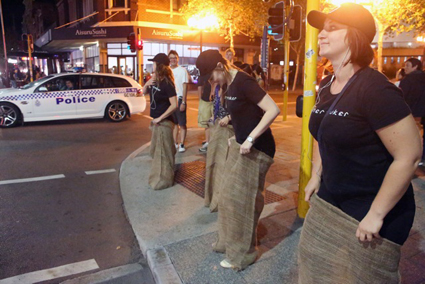A curative dose of spontaneity
Lauren Carroll Harris, pvi collective, Deviator

pvi collective, Deviator
courtesy the company
pvi collective, Deviator
Can citizens be playmates? Can cracks in the pavement form a jigsaw puzzle? Where Kaldore Public Arts Projects’ 13 Rooms made performers into living sculptures, Deviator by pvi collective makes audiences into performers playing an interactive app-led game in Sydney’s inner city.
At 6.30pm, outside National Art School, Darlinghurst, we players are given smartphones, headphones and codenames (I’m Susan Orlean from Charlie Kaufman’s Adaptation). A GPS-enabled app loads with an iconned map. Our instructions are to play hard, run fast and go far, find the QR codes indicated on the map, scan them and follow their directives to earn points.
It turns out the tasks are imaginative and socially acceptable forms of tiny rebellion. In my rovings, Deviator had me follow a stranger for two minutes (embarrassingly thrilling), write a message on one of many little chalkboards (“I still miss you”), plant broccoli seeds in Green Park (I shiftily took a few for my own garden) and be chased and kissed into submission by one of the games’ gatekeepers (clown-wigged “Motherfcuckers” stationed around the QR codes). In each task I felt like a kid with a secret. I felt like I owned the city.
The details are considered and finessed. A message interface allows us to send out mass communiques to our fellow players, the games are named after children’s games (Twister, Ring-A-Ring-A-Rosie) and QR codes are artfully hidden with a local’s insider knowledge. It’s flat out fun and seriously playful.
In a roundabout way, Deviator is about something more. The rhetoric of the app’s audio and text is of the Occupy Movement. But Deviator isn’t a movement; it’s saying something in itself. The artists’ critique is of the sameness of city life, the PR-powered politicians in lock-step, the pollution and distraction of mediocre media. The artists’ answer is to offer small doses of chaos and spontaneity, fleetingly recapturing public space through collective and softly subversive play.
It’s an abstract freedom that expires after the game’s 45 minutes, but it’s a kind of freedom nonetheless. So often in contemporary art, battles between ideas are waged in a void or white cubes. But art is not a self-sufficient world; pvi collective knows this, and Deviator’s on-street location animates its core ideas. If you’re not engaged, you’re not trying hard enough. Deviator isn’t a blueprint for social change, it’s a way for contemporary art to disrupt daily greyness, and hijacking the language of revolution is an effective, albeit purely polemical, way to do that.
Where the game succeeds best is in making audience members—strangers—into members of a collective. Imagine sprinting down Oxford Street, spotting another pink-cheeked, headphoned player and swapping a conspiratorial grin before running onwards. It’s radical.
Deviator is another vindication of Performance Space’s continued experimentation in off-site and, in this case, on-street programming. Following January’s Micro Parks which invaded tiny patches of forgotten inner west reserves, Deviator enlarges that map. I can’t help but think pvi collective have achieved their stated goal, using smartly and creatively engineered technology that brings people together. It’s a curatorial masterstroke to program this kind of event on a week night at an after-dark, cop-show start time. My friend and I felt like we’d been on a 45-minute holiday, then returned to our regularly scheduled post-work programming. Deviator stung us awake and made our city new.






